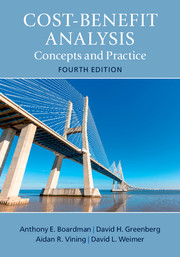Chapter 11 - Predicting and Monetizing Impacts
from PART II - FUNDAMENTALS OF CBA
Summary
Cost-benefit analysis assesses the efficiency of alternative courses of action. It requires prediction of the impacts of the alternatives and their monetization. The first ten chapters lay out the conceptual foundations for predicting and monetizing. This chapter and the following five chapters provide methods and resources for actually completing these tasks in practice. This chapter provides a brief overview of the various approaches to prediction and monetization. The following five chapters describe these approaches in detail
Keep in mind that good CBA predicts and monetizes all the impacts of the alternative policies being considered. Some impacts, such as the use of real resources to implement policies, can usually be predicted with considerable confidence in fairly straightforward ways and monetized directly with market prices. Other impacts, especially those involving people changing their behaviors, can only be predicted indirectly, often based on statistical inference or perhaps even theory alone, and therefore they may be very uncertain. Furthermore, monetizing often requires analysts to use shadow prices, such as willingness to pay for reductions in mortality risk, that are not directly revealed in markets and thus also uncertain. CBA requires analysts to accept these uncertainties to produce a comprehensive assessment of alternative policies.
Imagine that you completed the first three steps in CBA set out in Chapter 1. You have identified the alternative policies, determined standing, and catalogued the relevant impacts with appropriate units of measure. Next you must predict the impacts of each alternative and monetize them. Much of the effort in a typical CBA goes into these two steps. Unlike most social science research, where one can choose to focus on some impacts, perhaps because data are available to support estimation of past effects as the basis for prediction, you do not have the luxury of focusing on some impacts and ignoring others. You must make predictions of all impacts even in the absence of strong supporting evidence. To do this, you should use policy research, relevant theory, and, when all else fails, learn about the subject and make informed guesses. By all means be self-conscious about your uncertainties and be forthright in presenting them. Because of these uncertainties, Monte Carlo simulation and the other forms of sensitivity analyses illustrated in Chapter 7 are essential components of almost any CBA for conveying the degree of certainty in the ultimate CBA prediction of net benefits.
- Type
- Chapter
- Information
- Cost-Benefit Analysis , pp. 274 - 287Publisher: Cambridge University PressPrint publication year: 2017



